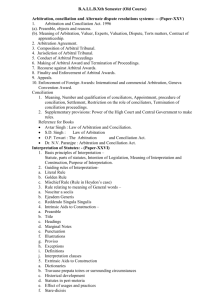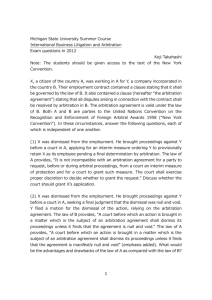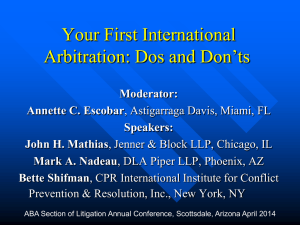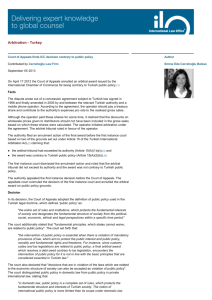cost follows the event in arbitration: its paradigm and relevance
advertisement
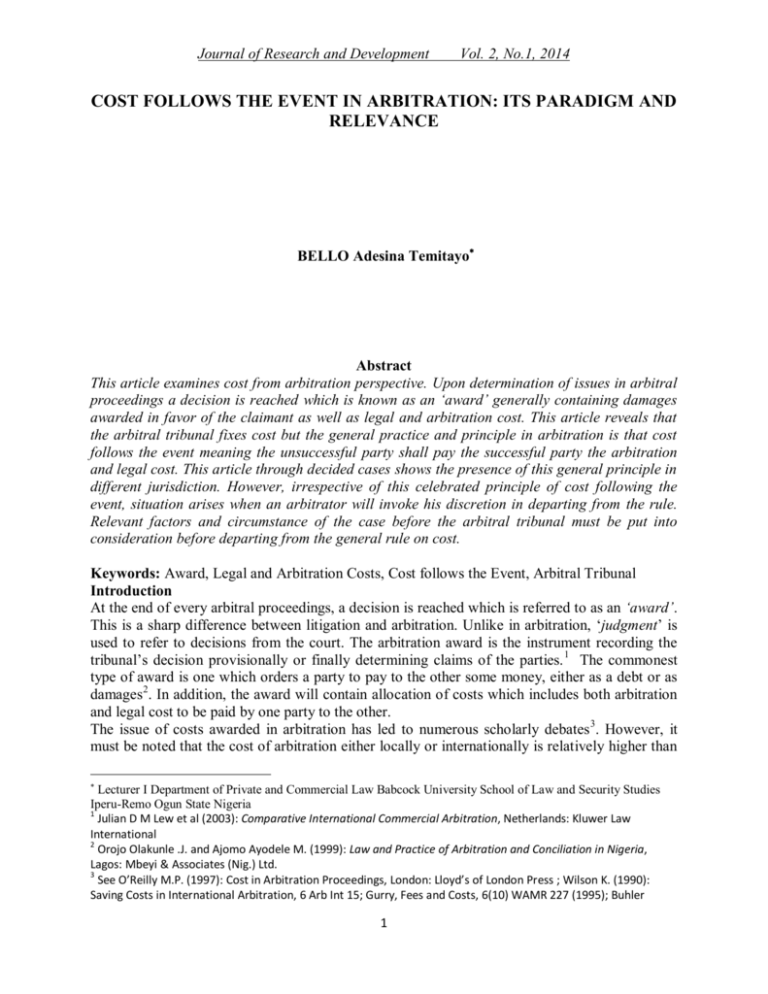
Journal of Research and Development Vol. 2, No.1, 2014 COST FOLLOWS THE EVENT IN ARBITRATION: ITS PARADIGM AND RELEVANCE BELLO Adesina Temitayo Abstract This article examines cost from arbitration perspective. Upon determination of issues in arbitral proceedings a decision is reached which is known as an ‘award’ generally containing damages awarded in favor of the claimant as well as legal and arbitration cost. This article reveals that the arbitral tribunal fixes cost but the general practice and principle in arbitration is that cost follows the event meaning the unsuccessful party shall pay the successful party the arbitration and legal cost. This article through decided cases shows the presence of this general principle in different jurisdiction. However, irrespective of this celebrated principle of cost following the event, situation arises when an arbitrator will invoke his discretion in departing from the rule. Relevant factors and circumstance of the case before the arbitral tribunal must be put into consideration before departing from the general rule on cost. Keywords: Award, Legal and Arbitration Costs, Cost follows the Event, Arbitral Tribunal Introduction At the end of every arbitral proceedings, a decision is reached which is referred to as an ‘award’. This is a sharp difference between litigation and arbitration. Unlike in arbitration, ‘judgment’ is used to refer to decisions from the court. The arbitration award is the instrument recording the tribunal’s decision provisionally or finally determining claims of the parties. 1 The commonest type of award is one which orders a party to pay to the other some money, either as a debt or as damages2. In addition, the award will contain allocation of costs which includes both arbitration and legal cost to be paid by one party to the other. The issue of costs awarded in arbitration has led to numerous scholarly debates 3. However, it must be noted that the cost of arbitration either locally or internationally is relatively higher than Lecturer I Department of Private and Commercial Law Babcock University School of Law and Security Studies Iperu-Remo Ogun State Nigeria 1 Julian D M Lew et al (2003): Comparative International Commercial Arbitration, Netherlands: Kluwer Law International 2 Orojo Olakunle .J. and Ajomo Ayodele M. (1999): Law and Practice of Arbitration and Conciliation in Nigeria, Lagos: Mbeyi & Associates (Nig.) Ltd. 3 See O’Reilly M.P. (1997): Cost in Arbitration Proceedings, London: Lloyd’s of London Press ; Wilson K. (1990): Saving Costs in International Arbitration, 6 Arb Int 15; Gurry, Fees and Costs, 6(10) WAMR 227 (1995); Buhler 1 Journal of Research and Development Vol. 2, No.1, 2014 the cost of litigation. Parties to arbitration will have to pay quite a range of fees which may include the travel fees, expense and hours spent of an arbitrator(s), cost of expert(s) that may shed more light on an issue for determination, services of a transcriber, fees for using a Centre as the place of arbitration etc. Moreover, the general principle and practice in arbitration is that the unsuccessful party in an arbitral proceedings shall pay all or substantial part of the arbitration and legal cost to the successful party. In other words the loser will pay the winner both the arbitration and legal cost of the arbitral proceedings. This principle is known as ‘cost follows the event’. This paper seeks to examine the principle of cost follows the event as well as its relevance in arbitration as a whole. Furthermore, there are situations whereby the arbitral tribunal will use its discretion to depart from this standard principle in the bid of achieving justice. Cost in Arbitration In ordinary parlance, cost is the amount of money required to be paid for something4. In a more technical sense such a law, it is the amount of money spent in pursuing a legal action, especially those expenses that the losing party may be required to pay5. In arbitration, the issue of cost is crucial as parties in disputes would have to bear not only their own cost but also that of their opponent’s legal and other costs. The arbitral tribunal fixes the cost of arbitration. Where the arbitration is institutional which means the arbitration proceedings is conduct by or under an arbitration institution which promotes or administers arbitral process such as Chartered Institute of Arbitrators Nigerian Branch, Lagos Court of Arbitration, the London Court of International Arbitration (LCIA), International Chamber of Commerce (ICC) etc. fixes the fees of the arbitrators in accordance with the schedule of fees set down in their respective rules. Notably, there are two main groups of cost related to arbitration: 1. Arbitration costs: this includes the fees of the arbitrator(s), hiring venue, transcribers, witnesses, administrative expenses. 2. Legal costs: this involves fees for legal representation and those who assisted in the preparation of the case.6 Also the legal advice given to the parties are part of legal costs. It is imperative to note that there exist methods used by arbitral tribunals in fixing costs. These methods include: 1. Ad valorem: the fees are fixed proportionate to the amount in dispute7. 2. Per diem: the fees are fixed payable per day8. 3. Fixed fee: A fixed amount for all arbitration without regard to the amount in dispute or the period of time the arbitration may take to complete9. Under the Arbitration and Conciliation Act (ACA)10 in its Section 49 makes provision concerning cost. It provides thus: Michael(1997): ‘Correction and Interpretation of Awards and Advances on Costs’ in: The New 1988 Rules of Arbitration, ICC Bulletin – Special Supplement 53-54 4 Encarta Dictionaries 5 Ibid 6 Gotanda J.Y. (1999): Awarding Costs and Attorneys’ Fees in International Commercial Arbitrations, Michigan Journal of International Law Vol. 21 No. 1, 1999 7 Ephraim Akpata (1997): The Nigerian Arbitration Law in Focus, Lagos: West African Book Publishers Ltd 8 Ibid 9 Ibid 10 CAP A18 Laws of the Federal Republic of Nigeria (LFN) 2004 2 Journal of Research and Development Vol. 2, No.1, 2014 1. The arbitral tribunal shall fix costs of arbitration in its award and the term “cost” includes only: a. The fees of the arbitral tribunal to be stated separately as to each arbitrator and to be fixed by the tribunal itself; b. The travel and other expenses incurred by the arbitrators; c. The cost of expert advice and of other assistance required by the arbitral tribunal; d. The travel and other expenses of witnesses to the extent that such expenses are approved by the arbitral tribunal; e. The costs for legal representation and assistance of the successful party if such costs were claimed during the arbitral proceedings, and only to the extent that the arbitral tribunal determines that the amount of such costs is reasonable.11 2. The fees of the arbitral tribunal shall be reasonable in amount taken account the amount in dispute, the complexity of the subject-matter, the time spent by the arbitrators and any other relevant circumstances of the case. 3. If an appointing authority has been agreed upon by the parties or designated by the Secretary-General of the Permanent Court of Arbitration at the Hague, and if that authority has issued a schedule of fees for arbitrators in international cases which administers, the arbitral tribunal in fixing his fees shall take that schedule of fees into account to the extent that it considers appropriate in the circumstances of the case. 4. If such appointing authority has not issued a schedule of fees for the arbitrators in international cases, any party may at any time request the appointing authority to furnish a statement setting forth the basis for establishing fees which is customarily followed in international cases in which the authority appoints arbitrators; and if the appointing authority consents to provide such a statement, the arbitral tribunal in fixing its fees shall take such information into account to the extent that it considers appropriate in the circumstances of the case. 5. In cases referred to in subsection (3) and (4) of this section when a party so requests and the appointing authority consents to perform the function, the arbitral tribunal shall fix its fees only after consultation with the appointing authority, which may make any comment it deems appropriate to the arbitral tribunal concerning the fees. 11 Emphasis mine 3 Journal of Research and Development Vol. 2, No.1, 2014 Also Article 31 of the International Chamber of Commerce (ICC) Rules of Arbitration12 states in its paragraph 1 that: ‘the cost of the arbitration shall include the fees and expenses of the arbitrator and the ICC administrative expenses fixed by the Court, in accordance with the scale in force at the time of the commencement of the arbitral proceedings, as well as the fees and expenses of any expert appointed by the Arbitral Tribunal and the reasonable legal and other costs incurred by the parties for the arbitration’ 13 Article 38 which is impari material with section 49(1) addresses cost for domestic arbitration. The above provision makes it evident that in the course of an arbitration proceeding, parties will liable for the arbitrator’s fees and expenses, the arbitration institution involved and legal costs. Be that as it may Article 3914 provides that the fees of the arbitral tribunal shall be reasonable in amount, taking into account the amount in dispute, the complexity of the subject matter, the time spent by the arbitrators and any other relevant circumstances of the case. In the case of Corona v. Amherst Partners15, it was held that the demanded fees by the arbitral tribunal should be reasonable and not outrageous. Thus, the aforementioned article tries to check the degree in which an arbitral tribunal may fix cost against the parties in dispute. Cost Follows the Event This simply means that the cost of the arbitration proceedings shall be paid by the unsuccessful party to the successful party. The arbitral tribunal is at liberty to apportion the costs of the arbitration as they see fit but the general principle is that the unsuccessful party bears the cost. Article 40 (1) and (2)16 upholds this general principle stating thus: 1. Except as provided in paragraph 2, the costs of arbitration shall in principle the be borne by the unsuccessful party. However, the arbitral tribunal may apportion each of such costs between the parties if it determines that apportionment is reasonable taking into account the circumstances of the case. 2. With respect to the cost of legal representation and assistance referred to in Article 38 paragraph (e), the Arbitral Tribunal, taking into account the circumstance of the case, will be free to determine which party shall bear such costs or may apportion such costs between the parties if it determines that apportionment is reasonable. Evidently, the arbitral tribunal is given discretionary power in assigning arbitration and legal cost. Unlike paragraph 1 of Article 40, paragraph 2 does not expressly state that the legal cost must be borne by the unsuccessful party. The arbitral tribunal having to its satisfaction 12 ICC Rules of Arbitration http://www.iccwbo.org/products-and-services/arbitration-and-adr/arbitration/icc-rulesof-arbitration/ accessed August 2nd 2014 13 Ibid ACA CAP A18 Laws of the Federal Republic of Nigeria (LFN) 2004, First schedule 14 Ibid 15 No. D040084 Cal. 4th App. Dist. April 1, 2003 16 Ibid (n 12), identical with Article 38 and 40 of the United Nations Commission on International Trade Law (UNCITRAL) Arbitration Rules 1976 4 Journal of Research and Development Vol. 2, No.1, 2014 considered the circumstances of the case will assign the legal cost either to the successful or unsuccessful party or both. In Switzerland arbitrators have discretion to apportion cost as they see fit. This was exemplified in the case of Compagnie des Bauxites de Guinee v Hammersmills Inc17. Notably this discretion to apportion cost is limited under Article 59 of the China International Economic and Trade Arbitration Commission CIETAC (Arbitration Rules) 18 which provides thus: ‘the arbitration tribunal has the power to decide in the arbitral award that the losing party shall pay the winning party as compensation a proportion of the expenses reasonably incurred by the winning party in dealing with the case. The amount of such compensation shall not in any case exceed 10% of the total amount awarded to the winning party.’ In Office and Industrial Cleaners Ltd v John Paul Construction Ltd 19 it was held that the discretion afforded to an arbitrator was not unqualified and had to be exercised judicially. It is imperative to note that in the context of costs awards, the general rule of cost follows the event has equal application to arbitrators as judges20. In England the principle of cost follows the event is entrenched in its Arbitration Act 1996 section 6121 stipulating that: 1. The tribunal may make an award allocating costs of the arbitration as between the parties, subject to any agreement of the parties. 2. Unless the parties otherwise agree, the tribunal shall award costs on the general principle that cost should follow the event22 except where it appears to the tribunal that in the circumstances this is not appropriate in relation to the whole or part of the costs. In the case of Channel Island Ferries Ltd v Cenargo Navigation Ltd (The Rozel)23 it was held that arbitrators should award all costs even if award much less than original claim. Phillips J said: ‘it is always necessary to exercise the greatest care before applying the reasoning in one case to a different factual situation, and this is particularly true in the field of damages. The majority of the Court in Ruxley Electronics did not hold that a plaintiff can recover in damages the cost of remedial measures which are unreasonable. They held that, in the circumstances of that case it was not unreasonable for the plaintiff to spend the substantial sum necessary to have what he had contracted for. The test of what was reasonable had to have regard to his personal preference, as expressed in the depth of water that he had 17 1992 WL 122712, XVIII YBCA 566 (1993) (DDC 1992) China International Economic and Trade Arbitration Commission (CIETAC) Arbitration Rules www.cietac.org/index/rules.cms accessed August 3, 2014 19 21 February 2008 [2008] IEHC 38 20 Vogelaar v Callaghan [1996] 1 IR 88 21 Arbitration Act 1996 (Chapter 23) – Legislation.gov.uk www.legislation.gov.uk.ukpga/19 accessed 4 August 2014 22 Emphasis mine 23 [1994] 2 Lloyd’s Rep 161 18 5 Journal of Research and Development Vol. 2, No.1, 2014 contractually required. This reasoning can be applied to a requirement which is incorporated in a contract as an end in itself, reflecting a personal preference of the contracting party. It does not apply where the contractual requirement is not an end in itself, but is inserted into a commercial contract because it has financial implications. If such a case, the contractual requirement is not met, the costs of remedial measures will not normally be recoverable as damages if they are disproportionate to the financial consequences of the breach. If that is the case it will not be reasonable to incur those costs. The damages recoverable will be those necessary to compensate for the financial consequences of the breach.’ In the Nigerian case of Ladega v Akiyili24, the court was of the view that the object awarding cost is not to punish the unsuccessful litigant but to compensate the successful party for the expenses to which he has been put by having come to court. This position held by the court is applicable to arbitration. It is instructive to note that there are situations when the arbitrator may depart from applying this general principle of cost following the event. The arbitrator however uses his discretion in engaging in this crucial departure. However in the case of Latoudis v Casey25, Justice Dawson described the discretion as ‘unqualified’, Justice McHugh J described it as ‘uncontrolled’, and Chief Justice Mason described it as ‘unconfined’. Be that as it may be described, it has being held that such discretion must be exercised judicially. 26 The CIETAC in its Article 50 (2)27 can be held to lay a foundation for making an arbitrator depart from the general rule. It states that: ‘The arbitral tribunal has the power to decide in the arbitral award, having regard to the circumstances of the case, that the losing party shall compensate the winning party for the expenses reasonably incurred by it in pursuing the case. In deciding whether or not the winning party’s expenses incurred in pursuing the case reasonable, the arbitral tribunal shall take into consideration such specific factor as the outcome and complexity of the case, the workload of the winning party and/or its representative(s), and the amount in dispute, etc.28’ The arbitrator must consider a lot of issues and factors surrounding the arbitral proceedings before using his discretion to depart from the general rule that cost must follow the event. Where there is unreasonable delay or employing delaying tactics to frustrate the arbitral process, the arbitrators and the other party(s) in dispute, the arbitrator may not apply the cost follows the event principle. In the case of Westland Helicopters Ltd. v Arab Organisation for 24 (1975) 2 S.C. 91 (1990) 170 CLR 534 26 Ibid Office and Industrial Cleaners Ltd v John Paul Construction Ltd 21 February 2008 [2008] IEHC 38 27 Ibid (n 18) 28 Emphasis mine 25 6 Journal of Research and Development Vol. 2, No.1, 2014 Industrialization29, the arbitral tribunal awarded £18million against the losing party for he delayed the proceedings which lasted 13 years. In addition in the case of Elgindata30 where the arbitral tribunal asserted that: ‘It is now clear that a too robust application of the follow the event principle encourages parties to increase the costs of the litigation or arbitration, since it discourages parties from being selective as to the points they take. Because if you recover all your costs as long as you win, you are encouraged to leave no stone unturned in your efforts to win.’ The above assertion was modified by Lord Woolf M.R. in Phonographic Performance Ltd v Rediffusion Music Ltd.31 He was of the view that: ‘…to the effect that where the successful party raises issues or make allegations which have failed, he may not only be deprived of some or all of his costs, but may be ordered to pay the whole or a part of the costs of the unsuccessful.’ Hence, where the successful party has issues that tend to prolong the timespan of the arbitration which was indeed not successfully contested, the arbitral tribunal can award cost against the successful party for such delay. In situations whereby the successful party was unsuccessful in a major issue that led to an increase in the cost of the arbitration, the arbitral tribunal can depart from the principle that cost follows the event. See the case of Forster v. Farquhar32. The attitude of the parties in the course of the arbitral proceedings plays a significant role in whether the arbitrator will invoke his discretion in departing from the general principle.33 When it is discovered that the successful party had shown attributes of dishonesty or exhibited acts that are contrary to public morality and public policy in the management of the transaction that led to the arbitration, the arbitral tribunal may depart from the general principle. Taking account of the Calderbank34 offer which is an offer for settlement made in the course of an arbitral proceedings from the respondent to the claimant. An arbitrator would be permitted to depart from the general principle of cost following the event in Arbitration and award cost to the claimant even though he is the successful party, where a reasonable settlement offer was made by the respondent which would have saved both time and cost of arbitration, but was rejected by the claimant on unreasonable grounds, except where it can be established that the claimant ought not to have accepted the offer 35. Moreover, where it is mutually agreed in writing that the costs of the arbitration should be allocated on a certain method, the arbitrator can depart from the general rule on cost and honor the agreement between the parties. 29 80 ILR 622 (1987-10-23) (1993) 1 All E.R. 232 31 (1999) 2 All E.R. 299 at 313.315 32 (1893) 1 QB 564 33 See Dutch Party v Turkish Party 125 Clunet 1047 (1998) 34 Calderbank v Calderbank [1975] ADR.L.R. 06/05 35 Perry Press v Chipper field & Stern [2003] EWCA 484 30 7 Journal of Research and Development Vol. 2, No.1, 2014 Conclusion The principle of cost follows the event is indeed logical. In the course of arbitration proceedings costs are incurred. Since numerous fees must be paid in order to make the arbitral proceedings fast and efficient, the disputant paying for all the services required must be reimbursed. The principle of cost follows the event states that the unsuccessful party in an arbitral proceeding must pay the cost of the arbitration and legal cost to the successful party. Costs are incurred because of the decisions of the parties whether contest the issue between them. The decision of one party will be right and the decision of the other will be wrong. To contest an issue in which one is unsuccessful, while not always unreasonable, is nonetheless less reasonable than to have conceded it; accordingly in general the unsuccessful party is responsible for his own costs. By extension, it is not reasonable for that party to expect the successful party to have conceded the issue, hence his usual responsibility for the successful party’s costs.36 An arbitrator is permitted to depart from the general rule of cost following the event provided he exercises his/her discretion on justifiable grounds consideration the circumstances of the case before him/her. References Arbitration Act 1996 (Chapter 23) – Legislation.gov.uk www.legislation.gov.uk.ukpga/19 Arbitration and Conciliation Act CAP A18 Laws of Nigeria 2004 Buhler Michael(1997): ‘Correction and Interpretation of Awards and Advances on Costs’ in: The New 1988 Rules of Arbitration, ICC Bulletin – Special Supplement 53-54 China International Economic and Trade Arbitration Commission (CIETAC) Arbitration Rules www.cietac.org/index/rules.cms Ephraim Akpata (1997): The Nigerian Arbitration Law in Focus, Lagos: West African Book Publishers Ltd Gotanda J.Y. (1999): “Awarding Costs and Attorneys’ Fees in International Commercial Arbitrations”, Michigan Journal of International Law Vol. 21 No. 1, 1999 ICC Rules of Arbitration http://www.iccwbo.org/products-and-services/arbitration-andadr/arbitration/icc-rules-of-arbitration/ Julian D M Lew et al (2003): Comparative International Commercial Arbitration, Netherlands: Kluwer Law International O’Reilly M.P. (1997): Cost in Arbitration Proceedings, London: Lloyd’s of London Press Orojo O.J. and Ajomo M.A. (1999): Law and Practice of Arbitration and Conciliation in Nigeria, Lagos: Mbeyi & Associates (Nig.) Ltd. 36 Dispute Resolution Authority, Cost Award and Statement of Reasons, Darren O Sioradain & Ors v. Padraig O Cathail agus Seamus O Cuinn & Ors Record No: DRA/2/2009 8
